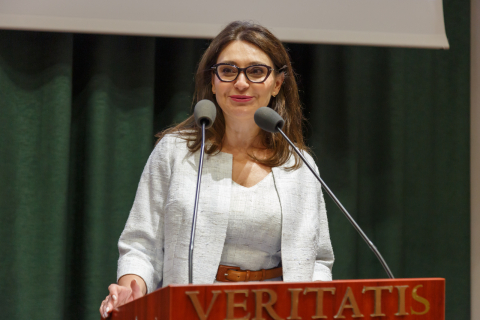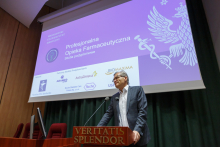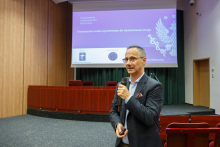The first edition of the program was just started. Among those present at the ceremony, there was professor Zbigniew Gaciong, Rector of WUM; Piotr Luliński, PhD, Dean of the Faculty of Pharmacy at WUM; and Marian Witkowski, chair of the Regional Chamber of Pharmacists, who presented a lecture. The meeting was opened by professor Magdalena Bujalska-Zadrożny, head of the study program and leader of the Pharmacotherapy and Pharmaceutical Care Institute and Unit at WUM.
First on-site class
During the two-day class session, practicing doctors and pharmacists discussed the new official competences of pharmacists, pharmaceutical care in heart failure and insulin treatment. There was also a communication and patient consulting workshop, drug information search practice, and training in glycemia measurement.
Contents of the program
– Our syllabus covers matters that offer a better understanding of most important chronic diseases, selected symptoms and ailments, while at the same time providing training in practical skills which are relevant for pharmaceutical care – professor Magdalena Bujalska-Zadrożny says, adding: – It is our intention to improve competences of pharmacists which are related to pharmacotherapy assessment; therefore, part of the course covers diagnostic tests. We also place great emphasis on training in communication competences necessary for interviewing patients and building the pharmacist-patient and pharmacist-doctor relations.
Practice is key
Prof. Bujalska-Zadrożny puts practice first. Pharmacists will receive practical guidance and specific procedural algorithms, as well as an opportunity to practice and improve in providing pharmaceutical care. Some classes will be taught by doctors with significant clinical experience.
The Professional Pharmaceutical Care post-graduate course consists of 2 semesters and 196 class hours (92 hours of lectures and 104 hours of practice). Class sessions are held on Saturdays and Sundays, usually once a month.
Registration for the second edition pending
The first edition of the study program will end in April next year. However, edition 2 opens already in October. Registration is open by the end of August.



